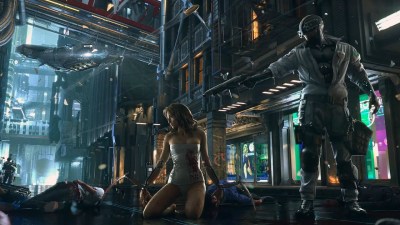One of the most infuriating design trends in games these days is when developers try too hard to be a jack of all trades. Not content with giving you a gun and asking you to shoot down enemies, they also take you to one side and explain that you can also avoid combat entirely, if you like. Or, they introduce role playing elements. Increasingly often it feels as though video game developers arenā€™t confident enough about the strength of a single aspect of their game design, so they instead bombard you with a cavalcade of options hoping something will stick.
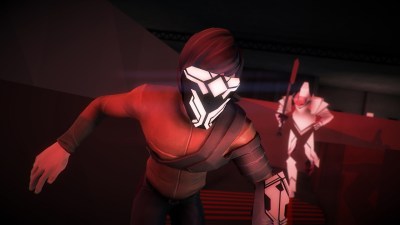 Volume, Mike Bithellā€™s follow up to the acclaimed minimalist platformer Thomas Was Alone, is different. Wearing its heart on its sleeve, Volume is unashamedly a game about stealth, a game about getting from the beginning to the end of a level and collecting all the loot in the shortest time possible - all within a world that feels as though itā€™s about to make a Codec call to Konamiā€™s lawyers.
Volume, Mike Bithellā€™s follow up to the acclaimed minimalist platformer Thomas Was Alone, is different. Wearing its heart on its sleeve, Volume is unashamedly a game about stealth, a game about getting from the beginning to the end of a level and collecting all the loot in the shortest time possible - all within a world that feels as though itā€™s about to make a Codec call to Konamiā€™s lawyers.
Thereā€™s no denying it (and to his credit, Bithell is upfront about his inspiration): Volume looks almost identical to Metal Gear Solid‘s VR training missions. Its simple, neon-infused layouts populated by patrolling guards are so evocative of Kojimaā€™s iconic brainchild that you never quite manage to ignore the comparisons long enough to appreciate Volume as its own separate work.
That isnā€™t to say that Volume doesnā€™t have any ideas of its own, however. This isnā€™t just a straightforward retread of familiar gameplay. It walks the same boards, sure: guards have vision cones, you can distract them to create a clear route to where you want to go, and you have tools at your disposal to help you along; but Volume succeeds largely thanks to the gadgets placed at your disposal, some wonderful level design, and by instilling a feeling that no matter how you completed a level, you could have completed it in any number of different ways.
Presented as a straightforward list of isolated spaces, your goal in each stage is to collect all the gems on the level and reach the exit. Guards block your access to essential 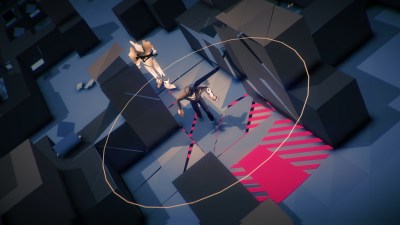 loot or otherwise impede your ability to progress, but can be distracted or disposed of via various means. A nearby toilet can be flushed to draw attention, for example; you can also make a noise at your current position, before slinking off as a guard comes to investigate.
loot or otherwise impede your ability to progress, but can be distracted or disposed of via various means. A nearby toilet can be flushed to draw attention, for example; you can also make a noise at your current position, before slinking off as a guard comes to investigate.
While the first handful of levels deal exclusively with teaching you these most basic of mechanics, it isnā€™t long before Volume introduces you to a variety of useful gadgets. Each of these can only be used on the level you find them - thereā€™s no carry-over of abilities here, meaning that Volume never becomes a kind of sandbox stealth game - and each has an entirely different function.
One of the most useful of these gadgets allows you to bounce sound around a level to cause a distraction, directing it to where you want a guard to go by recoiling the noise off of several walls. Another gadget masks the sound of your footsteps, and thereā€™s also a straightforward blackjack you can find to knock guards unconscious.
 While the tools arenā€™t especially imaginative, they do allow for some creative use of Volumeā€™s otherwise limited toolset, and on occasion theyā€™re put to surprisingly creative use. Volume‘s levels may essentially boil down to puzzles, and the brainpower required to solve them certainly does increase; but you never feel frustrated, and after a relatively rigid opening, the level design starts to accommodate multiple approaches.
While the tools arenā€™t especially imaginative, they do allow for some creative use of Volumeā€™s otherwise limited toolset, and on occasion theyā€™re put to surprisingly creative use. Volume‘s levels may essentially boil down to puzzles, and the brainpower required to solve them certainly does increase; but you never feel frustrated, and after a relatively rigid opening, the level design starts to accommodate multiple approaches.
100 levels are included off the bat. Itā€™s a generous figure, but can lead to a meandering pace. The opening section, for example, spends far too much time teaching players the basics. Often, it feels as though Volume is generous for the sake of it, rather than its bloated size being necessary to accommodate the narrative. On top of that, and in a move which is likely where the long term appeal of the game will lie, is the level editor.
The community has already been busy creating and uploading all kinds of devious challenges for you to download and try, and the addition of leaderboards will undoubtedly assure that many will find themselves sucked into the competitive urge to best the playthroughs of friends and strangers alike.
Sadly, Volume also sometimes falls down. After the success of Thomas Was Alone, developer Mike Bithell had resources at his disposal (in other words, cash and a high 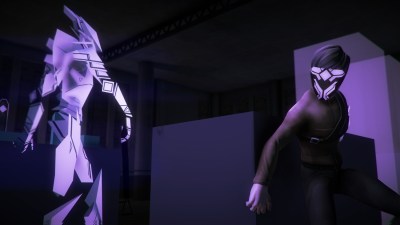 profile) that most indie developers could only dream of. Perhaps a victim of his own success, itā€™s led to his second game coming across as a little insecure and trying to show itself up.
profile) that most indie developers could only dream of. Perhaps a victim of his own success, itā€™s led to his second game coming across as a little insecure and trying to show itself up.
The result is that while, mechanically speaking, Volume is a relatively small game that has a purity of purpose about it, itā€™s also a game that sometimes tries to present itself as more than it really is. If Volume were a guest at a party, it would be that guy who dresses himself in a designer suit and boasts about his many celebrity friends, before quietly explaining that heā€™s an apprentice dentist in Walthamstow.
This is most apparent in the celebrity voice casting. Danny Wallace voices protagonist Locksleyā€™s erstwhile AI companion, delivering his lines with the same trademark acerbic wit and timing that made him such an asset in Thomas Was Alone. Andy Serkis - better known as Gollum in Peter Jacksonā€™s The Lord of the Rings trilogy of films - provides the voice of the villainous Guy Gisborne.
Both turn in fine performances (though Serkis sometimes sounds a little too pantomime to be a credible villain); but their presence is the most apparent sign that Bithell perhaps felt a lot of pressure to go large with Volume, to utilize the vastly increased resources made available to him by Thomas Was Aloneā€™s success.
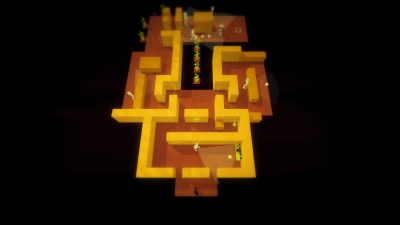 In what feels almost like a concession to a more humble past - “Hey, Iā€™m still Indie!” - the voice of playable protagonist Robin Locksley is provided by YouTuber Charlie McDonnell. McDonnell, sadly, turns in a performance that doesnā€™t really suit the role. Lines are spoken in a tone that often feels at odds with the situation, meaning that essential story beats lack the necessary dramatic impact to make the narrative as engaging as it could otherwise be.
In what feels almost like a concession to a more humble past - “Hey, Iā€™m still Indie!” - the voice of playable protagonist Robin Locksley is provided by YouTuber Charlie McDonnell. McDonnell, sadly, turns in a performance that doesnā€™t really suit the role. Lines are spoken in a tone that often feels at odds with the situation, meaning that essential story beats lack the necessary dramatic impact to make the narrative as engaging as it could otherwise be.
Volumeā€™s story also sometimes feels as though it isnā€™t sure what it wants to be. Is it a warning against the evils of unfettered corporatism? Is it commentary on the modern culture of haves and have nots? Or is it a humorous new spin on the Robin Hood myth? Volume flirts with all of these angles and more throughout the course of its central narrative, but never quite feels as though it is ready to settle into a single role.
Volume is an impressive game, of that thereā€™s no doubt. Itā€™s focused, surprisingly inventive, and well polished. But itā€™s also often grand for the sake grandness. The campaign is generous but excessively so; the narrative feels as though it wants to be profound without ever quite achieving it; and the celebrity cast sometimes feel there simply so the game can be advertised by saying “Hey! These guys are in this!”, rather than actually adding to the experience.
When Volume leaves all of that frippery behind, it blossoms into something really very special indeed. Whether itā€™s through challenging yourself to find the most efficient way through a level in order to climb the leaderboards, the way enemy and item placement subtly directs you towards the ideal route, or the way in which the game cleverly allows Bithellā€™s own stages to be interchanged with ones from the community within the campaign, Volume isnā€™t short of reasons to fall in love with it. Itā€™s just a shame that sometimes it forgets its own strengths and instead decides to focus too heavily on its weaknesses.
Thomas Was Alone didnā€™t carry the weight of hype and expectation placed on Volume; but once you deliver a hit, however unexpected, the pressure will always be to go large, to exceed expectations. Volume certainly attempts to do just that - but itā€™s a game that would, ironically, have been better served by cutting away the grandiose ambition to be something more than it is. Halving the level count would have made for a tighter game pace; ditching the overt narrative focus would have allowed the game mechanics to breathe.
Ultimately, Volume is an excellent game with a few flaws that stand out, but which donā€™t become enough of a problem to spoil your enjoyment. If you get the opportunity to do so, and youā€™re interested in the stealth-em-up genre, you should definitely pick it up. But it occasionally feels as though the weight of expectation has led to Volume trying to be more than it is, when really all it needed to be was confident in its own skin.


